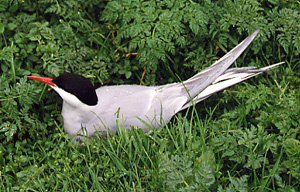Tern
|
|
| Terns | ||||||||||
|---|---|---|---|---|---|---|---|---|---|---|
 | ||||||||||
| Scientific classification | ||||||||||
| ||||||||||
| Genera | ||||||||||
|
Terns are seabirds in the family Sternidae, previously considered a subfamily Sterninae of the gull family Laridae. They are less closely related to the waders, auks and skimmers. They have a worldwide distribution.
Most terns belong to the large genus Sterna, with the other genera being small, though some authorities split the genus Sterna into several smaller genera (see list, below).
Many terns breeding in temperate zones are long-distance migrants, and the Arctic Tern probably sees more daylight than any other creature, since it migrates from its northern breeding grounds to Antarctic waters. One Arctic Tern, ringed as a chick (not yet able to fly) on the Farne Islands off the Northumberland coast in eastern Britain in summer 1982, reached Melbourne, Australia in October 1982, a sea journey of over 22,000 km (14,000 miles) in just three months from fledging - an average of over 240 km per day, and one of the longest journeys ever recorded for a bird.
They are in general medium to large birds, typically with grey or white plumage, often with black markings on the head. They have longish bills and webbed feet. They are lighter bodied and more streamlined than gulls, and look elegant in flight with long tails and long narrow wings. Terns in the genus Sterna have deeply forked tails, those in Chlidonias and Larosterna shallowly forked tails, while the noddies (genera Anous, Procelsterna, Gygis) have unusual 'notched wedge' shaped tails, the longest tail feathers being the middle-outer, not the central nor the outermost.
Most terns (Sterna and the noddies) hunt fish by diving, often hovering first, but the marsh terns (Chlidonias) pick insects of the surface of fresh water. Terns only glide infrequently; a few species, notably Sooty Tern, will soar high above the sea. Apart from bathing, they only rarely swim, despite having webbed feet.
Terns are generally long-lived birds, with several species now known to live in excess of 25-30 years.
Classification & species list
Charadriiformes
- Suborder Charadrii: The waders.
- Suborder Lari
- Family Laridae (gulls)
- Family: Sternidae
- Genus Sterna
- (Sub)Genus Gelochelidon - Gull-billed Tern. Long legs, stout black bill; mostly freshwater or brackish coasts.
- Gull-billed Tern, Sterna nilotica (Gelochelidon nilotica)
- (Sub)Genus Hydroprogne - Caspian Tern. Very large; black cap largely retained in winter; mostly freshwater or brackish coasts.
- Caspian Tern, Sterna caspia (Hydroprogne caspia)
- (Sub)Genus Thalasseus - crested terns. Large terns with a shaggy black crest; strictly coastal.
- Royal Tern, Sterna maximus (Thalasseus maximus)
- Greater Crested Tern or Swift Tern, Sterna bergii (Thalasseus bergii)
- Chinese Crested Tern, Sterna bernsteini (Thalasseus bernsteini)
- Elegant Tern, Sterna elegans (Thalasseus elegans)
- Lesser Crested Tern Sterna bengalensis (Thalasseus bengalensis)
- Sandwich Tern, Sterna sandvicensis (Thalasseus sandvicensis)
- Subgenus Sterna - typical white terns. Medium size; generally white or pale grey below, grey above, full black cap in summer, no crest; bill usually red; mostly inshore coastal, some also inland and some oceanic pelagic.
- River Tern Sterna aurantia
- Roseate Tern, Sterna dougallii
- White-fronted Tern, Sterna striata
- Black-naped Tern, Sterna sumatrana
- South American Tern, Sterna hirundinacea
- Common Tern Sterna hirundo
- Arctic Tern Sterna paradisaea
- Antarctic Tern, Sterna vittata
- Kerguelen Tern, Sterna virgata
- Forster's Tern, Sterna forsteri
- Trudeau's Tern, Sterna trudeaui
- White-cheeked Tern Sterna repressa
- Black-bellied Tern, Sterna acuticauda
- Black-fronted Tern, Sterna albostriata
- Subgenus Sternula - little tern group. Small; white forehead, short tail; inshore coastal and large rivers.
- Little Tern Sterna albifrons
- Saunders' Tern, Sterna saundersi (Often considered conspecific with Little Tern)
- Least Tern Sterna antillarum (Often considered conspecific with Little Tern)
- Yellow-billed Tern, Sterna superciliaris
- Peruvian Tern, Sterna lorata
- Fairy Tern, Sterna nereis
- Damara Tern, Sterna balaenarum
- Subgenus Haliplana - "brown-backed" terns. Medium size; white forehead, dark grey to brown-black mantle; pelagic oceanic.
- Aleutian Tern, Sterna aleutica
- Grey-backed Tern, Sterna lunata
- Bridled Tern, Sterna anaethetus
- Sooty Tern, Sterna fuscata
- Chlidonias - marsh terns. Small; short tail; freshwater breeding, largely insect-feeding.
- Whiskered Tern Chlidonias hybridus
- White-winged Tern or White-winged Black Tern Chlidonias leucopterus
- Black Tern Chlidonias niger
- Phaetusa - Large-billed Tern. Medium size; South America, mainly on rivers.
- Large-billed Tern Phaetusa simplex
- Anous, Procelsterna, Gygis - noddies. A tropical group, characterised by the notch-wedge shaped (not forked) tail; coastal and pelagic oceanic.
- Brown Noddy Anous stolidus
- Black Noddy Anous minutus
- Lesser Noddy, Anous tenuirostris
- Blue Noddy, Procelsterna cerulea
- Grey Noddy, Procelsterna albivitta
- White Tern, Gygis alba
- Larosterna - Inca Tern. An aberrant species unlike any other tern; coastal.
- Inca Tern Larosterna inca
- Family Stercorariidae (skuas)
- Family Rhynchopidae (skimmers)
- Suborder Alcae The auks.
Other usage
In North East Scotland people who are talking about "the Tern" are quite likely referring to an oil field or oil platform operated in the Shetland basin by Shell/ Esso. All of this consortium's UK assets are referred to by the names of various seabirds (though when they have bought assets from other operators, they have sometimes retained existing names).da:Terner de:Seeschwalben fr:Sternidé it:Sternidae nl:Sternidae pl:Rybitwy fi:Tiirat sv:Tärna
